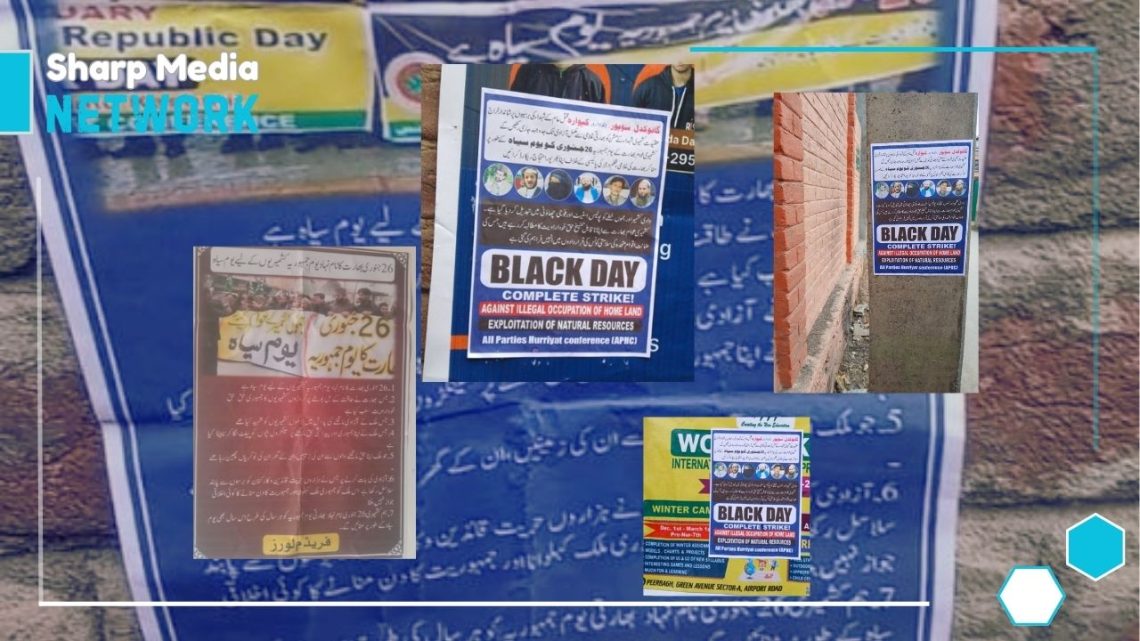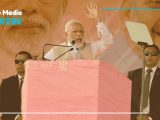
Kashmiris Mark India’s Republic Day as Black Day in Protest
January 22, 2025Across Srinagar and other areas of IIOJK, posters have appeared calling for January 26 to be observed as “Black Day,” highlighting the region’s ongoing struggle for self-determination.
In Indian illegally occupied Jammu and Kashmir (IIOJK), posters have been plastered throughout Srinagar and other towns, urging the people to observe India’s Republic Day, January 26, as Black Day. The posters, organized by the All Parties Hurriyat Conference (APHC) and supported by several other groups, carry strong messages criticizing India’s occupation of Kashmir. Phrases such as “26 January, Indian Republic Day is a Black Day for Kashmiris” and “UN must fulfill its plebiscite promise with the Kashmiris” dominate the posters, reflecting the deep dissatisfaction and anger felt by the Kashmiri population.
The posters also condemn India’s actions in IIOJK, accusing the Indian government of misleading international organizations regarding the region’s status. Images of prominent Kashmiri leaders, who are either imprisoned or in exile, are featured prominently. These include APHC Chairman Masarrat Aalam Butt, Vice Chairman Shabbir Ahmad Shah, Jammu and Kashmir Liberation Front (JKLF) Chairman Muhammad Yasin Malik, Mirwaiz Umar Farooq, Dukhtaran-e-Millat Chairperson Aasiya Andrabi, Mushtaqul Islam, and other APHC leaders. Their faces, often seen as symbols of resistance, underscore the ongoing struggle for Kashmiri self-determination.
The posters also serve to honor the martyrs of various massacres carried out by Indian forces in IIOJK. They specifically pay tribute to those who lost their lives in events like the Sopore, Gawkadal Srinagar, Handwara, and Kupwara massacres, which occurred in January. These incidents, which have left deep scars in the region’s collective memory, are remembered as part of IIOJK’s ongoing resistance against Indian rule.
The APHC has raised alarm over the current situation in IIOJK ahead of Republic Day, expressing concern over the increasing militarization and the imposition of more lockdown measures by Indian authorities. The additional deployment of Indian forces has fostered an atmosphere of fear and insecurity among Kashmiris, with many feeling vulnerable about their lives, honor, and dignity. The heavy presence of Indian troops and the restrictions placed on daily life have fueled a sense of powerlessness and frustration.
While India celebrates Republic Day on January 26 to commemorate the adoption of its Constitution in 1950, the APHC has criticized the country’s current direction under the Hindutva ideology, promoted by the ruling RSS-BJP alliance. The APHC argues that this shift towards a more communal and authoritarian agenda has exacerbated the suffering of Kashmiris and undermined the secular principles originally enshrined in India’s Constitution. The group asserts that the region’s situation has worsened under this new leadership, which has only deepened the occupation and disregarded the rights of the Kashmiri people.
The call for observing January 26 as Black Day serves as a reminder of IIOJK’s unresolved struggle for self-determination and the unfulfilled promises made by the international community. As Kashmiris continue to face oppression, they remain determined to highlight their plight and call for justice on the global stage.

